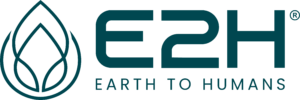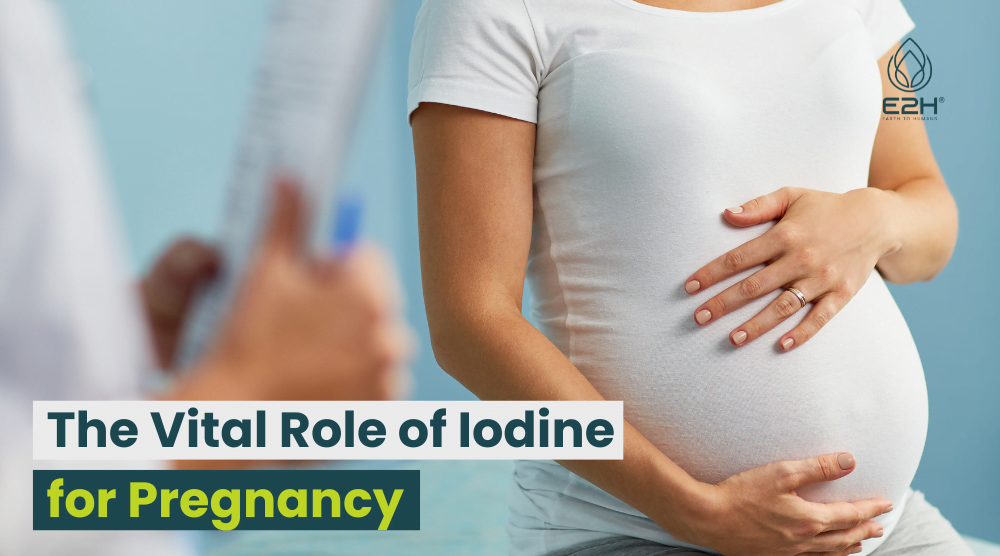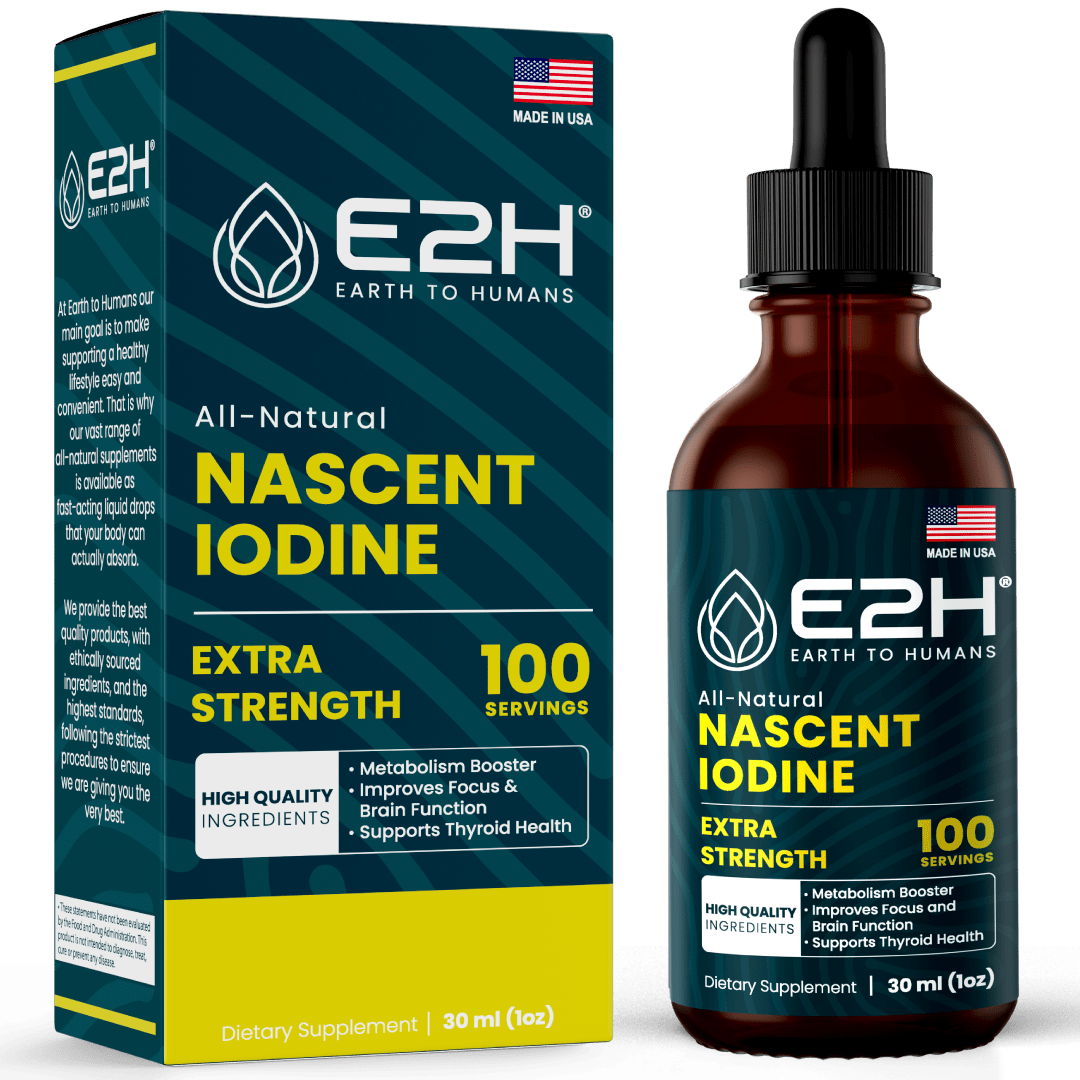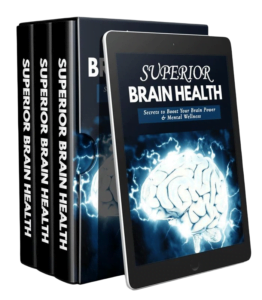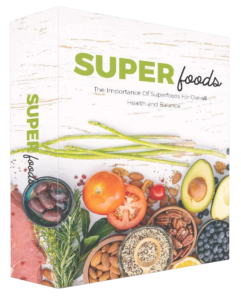Iodine plays a vital role in pregnancy by supporting the healthy development of the baby’s brain and nervous system. Adequate iodine intake is crucial during pregnancy to prevent cognitive and neurological deficits in the child. Consult your healthcare provider for personalized guidance on iodine supplementation and a balanced diet.
The Importance of Iodine for Pregnancy
Thyroid hormones are produced by thyroid glands, which help to promote healthy adrenal glands during the development of a fetus’ immune system during pregnancy. If you are pregnant, your body needs iodine to ensure it goes into your baby’s bloodstream. In 1989, studies evaluated birth defect status in pregnant women.
It showed that pregnant women who did not get enough iodine had babies born with neurological defects [1]. A recent study from the American Society for Epidemiologic Research found that women who were given iodine-containing supplements during pregnancy had babies with fewer birth defects than those who didn’t receive the supplement [2].
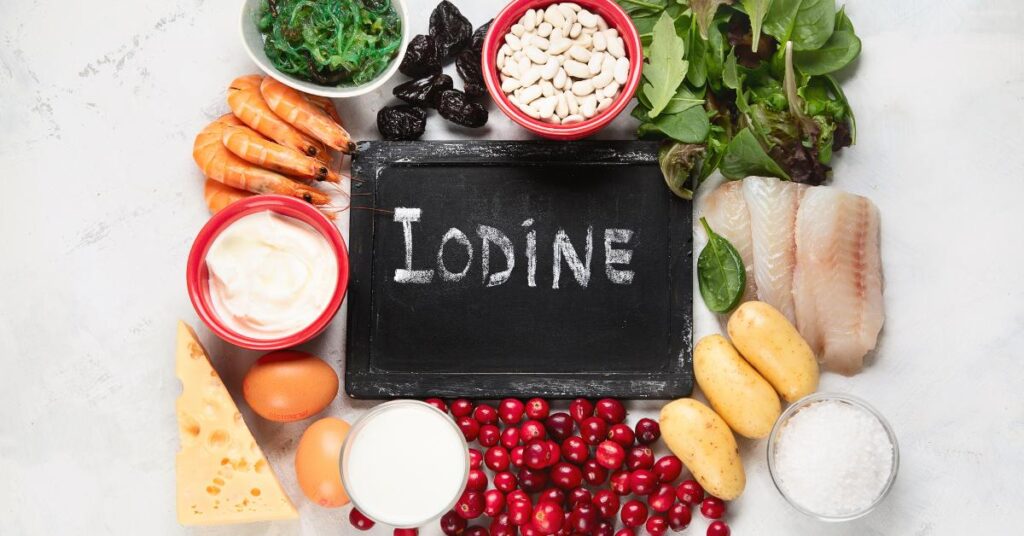
The American Thyroid Society also suggested taking iodine in more amounts to fulfill the needs of both mother and the baby. Deficient levels of iodine in the mother during pregnancy have been correlated with decreased IQ and the child’s mental health [3].
Iodine also plays a crucial role in lactation. The iodine can pass on to your baby through breastfeeding. The iodine a mother consumes will help the baby’s brain and thyroid development to reach its maximum potential.
How much iodine during pregnancy?
Iodine should be taken in a sufficient amount. Either low or high levels of iodine both have detrimental effects on health. The National Health and Medical Research Council (NHMRC) recommends that women take 220 micrograms of iodine per day when pregnant and 270 micrograms per day when breastfeeding [4]. The best source of iodine during pregnancy is liquid iodine supplements, as it provides maximum absorption without irritating the lining of your gut.
The required amount of iodine can be taken through foods rich in iodine and using iodized salt while cooking. If you are pregnant or planning to become pregnant, you should also take a prenatal vitamin that contains at least 150 mcg of iodine. You must read the label thoroughly because most prenatal vitamins do not contain iodine. The most consistent source of iodine in prenatal vitamins is Potassium iodide [5]. If you are known to have any disease, you must consult your healthcare provider before moving toward iodine supplements.
What foods are good for severe iodine deficiency?
Iodine is an essential trace mineral that our body can not make. It means that we must intake it through foods or supplements. Most of the foods in our daily routine are enough to compensate for mild iodine deficiency. However, you would need iodine-rich foods to combat severe deficiency. Iodine is found mainly in oceans and soil.
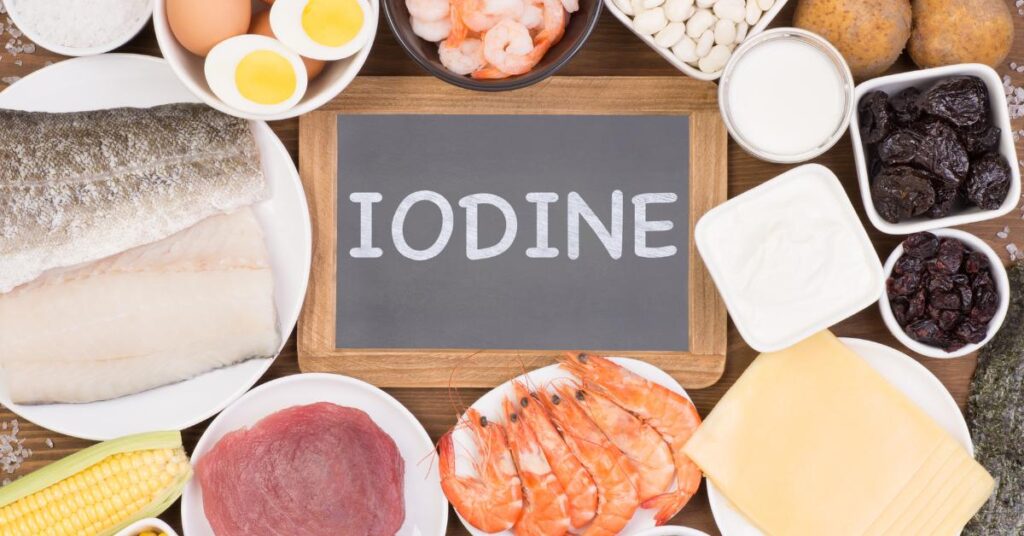
The amount of iodine varies, affecting the contained mineral in a food product. It is commonly found in sea animals and protein-rich animal foods, and a lesser amount can be traced to fortified foods like bread, cereals, and milk. If you are facing severe iodine deficiency, you must add the following foods to your diet.
- Seaweed (nori, wakened, kelp, kombu)
- Fish, shellfish (tuna, salmon, cod, oysters, shrimp)
- Iodized table salts
- Dairy products (milk, cheese, yogurt)
- Eggs
- Beef liver
- Chicken
What foods have low iodine?
Low iodine is necessary to treat hyperthyroidism (a common thyroid disease). According to the American Thyroid Association, if you are following a low-iodine diet, you must consume only 50 micrograms of iodine daily. This diet is mostly advised to follow when the patient prepares for any medical procedure to identify any specific thyroid disorder [6]. This diet usually lasts for only a week. Some of the recommended foods to eat during a low-iodine diet are:
- Non-iodized salts
- Unprepared meat
- Natural fruits, but avoid cherries
- Natural vegetables, except for frozen peas
- Natural cereals, except for processed breakfast products that contain coloring agents or additives
- Dairy-free tea or coffee
- Vegetable milk, except for soy milk
Sometimes people get confused about what to eat and what not when following a low-iodine diet. Remember that the World Health Organization (WHO) recommends consuming salt of less than 5g per adult in a day [7]. For a tasty meal, use lots of fruits and vegetables to get stunning colors and herbs to enhance the taste.
How is the child affected by iodine deficiency?
According to Iodine Global Network (IGN), it’s estimated that around 35 million newborns are unprotected from adverse effects of iodine deficiency worldwide. Pregnant and breastfeeding women must take iodine in a sufficient amount, or else these adverse effects will be found in their offspring:
- Mental retardation: Severe iodine deficiency leads to endemic cretinism, which can cause mental retardation, hearing disorders, and neurological impairments.
- Short stature: Iodine deficiency can also cause stunted growth.
- Poor sexual development: Thyroid stimulating hormone is responsible for producing sex hormones. Your body’s ability to get the benefits of testosterone is highly dependent on healthy thyroid metabolism.
- Other symptoms: Maternal iodine deficiency during pregnancy can increase the chances of miscarriages, stillbirth, and low birth weight in offspring. The lack of maternal iodine has also been associated with less-developed fine motor skills, lower IQ levels, and impairment in neurological systems [8].

Does low iodine increase the risk of miscarriages?
According to the National Institute of Child and Health development, women with low or moderate iodine deficiency can have difficulty conceiving a child. Furthermore, low iodine levels can cause miscarriages, too [9].
Which salt is good for pregnant women?
As we all know, severe iodine deficiency disorders have been linked with an increased risk of complications. If you want to keep yourself and your baby healthy, then you should consume “Iodized salt.” All table salts have added trace mineral iodine to maintain their iodine levels.
Is Iodine Supplementation safe for pregnant women?
It is recommended that women consume 150 micrograms of iodine per day. However, when it comes to childbearing mothers or breastfeeding their children, it’s crucial to take 250 micrograms of iodine to meet the needs of themselves and their infants. You can consume this amount through iodine-containing foods, nutritional supplements, or medications. It’s not reported that iodine supplements can harm pregnant women with normal iodine levels [10]. However, it is advised to consult your gynecologist before heading towards any medication.
How to know if you are taking the right amount?
Usually, an individual cannot comprehend how much iodine you take in a day and if it’s within the prescribed limit. As iodine is being used in many commercial products, they don’t include it. However, you can do a rough calculation based on the following:
- If you consume iodized salt
- If you take any iodine supplement, each medicine must have a fixed iodine level.
- If you are taking excessive seafood, meat, or dairy products
If you are consulting any physician, they will recommend you the following methods:
Median Urinary iodine concentration (UIC)
In order to get a better indication of iodine intake, the best way is to measure the amount of iodine through urine testing. More than 90% of the iodine you ingest usually gets excreted through urine. A median urine concentration lies between 100 to 200 mcg/l. Urine iodine concentration varies with fluid intake, but still, it’s a good assessment marker for checking iodine levels.
Iodine patch test
It is one of the most interesting tests where the doctor will paint a patch of iodine on your skin. The patch will be checked after 24 hours. The patch will not fade no sooner than 24 hours for people who are not iodine deficient. However, people with low iodine levels will have faded patches because their skins have absorbed the iodine more quickly. It’s an inexpensive method, but it’s not more accurate.
Iodine blood test
Blood tests can accurately detect any abnormal thyroid function that leads to hyperthyroidism or hypothyroidism in the body. Thyroglobulin blood testing in adults can be a helpful way to measure adequate iodine nutrition. Remember, only adequate thyroid hormone functioning are vital for your infants’ brain development.
What happens if you take too much iodine?
The upper-level intake of iodine is the maximum amount you consume daily. The UL for iodine for adults, pregnant and lactating women is 1,100 mcg per day [11]. High iodine intake can cause inflammation in the thyroid gland, and at an adverse stage, it can lead to thyroid cancer. Large doses of iodine can also cause burning in the mouth, throat, and stomach. Some people have also complained about nausea, vomiting, diarrhea, and weak pulse. Both are harmful to your body if you take iodine in large amounts or low amounts. But early detection can prevent you from hazardous diseases.
Look for signs and symptoms of hypothyroidism
Symptoms of inadequate Thyroid levels (hypothyroidism) generally develop slowly, or you get confused and think they are due to other health issues. Some of the signs and symptoms are:
- Tiredness
- Being sensitive to low temperatures
- Gain in weight
- Depression
- Muscle pain and weakness
- Brittleness in hair and nails
- Irregularity in the menstrual cycle
- Constipation
- Muscle cramps
- Dry and scaly skin
Infants with low thyroid levels experience slow growth and development. In adults, memory problems and depression have been observed. While in teenagers, early puberty has been examined.
Look for signs and symptoms of hyperthyroidism
More than normal thyroid function is a condition known as hyperthyroidism. Some of the symptoms that have been examined in people with a high level of thyroid levels are
- Swelling in the neck is caused by an enlarged thyroid gland called goiter
- Anxiety and nervousness
- Mood swings
- Hyperactivity
- Muscle weakness
- Increased rate of urination
- Itchiness
- Persistent thirst
- Diarrhea
- Sensitivity to heat
- Tiredness
You must visit a general physician at the earliest if you find any symptoms or signs of either hypothyroidism or hyperthyroidism.
Can someone check his thyroid hormone levels?
You can detect the higher thyroid hormone level by assessing your neck. If you have a swollen neck, it means that you are facing an increase in thyroid level, but it’s not an accurate technique. Blood screening is the only most accurate technique to check thyroid hormone levels.
FAQs
How does iodine support the development of the baby’s brain and nervous system during pregnancy?
Iodine is an essential nutrient for the production of thyroid hormones. These hormones are critical for the proper development of the baby’s brain and nervous system, particularly during the early stages of pregnancy.
How much iodine should pregnant women consume for optimal health?
The recommended daily intake of iodine for pregnant women is 220 micrograms (mcg). However, requirements may vary based on individual factors, so it’s important to consult with a healthcare provider for personalized recommendations.
What are good dietary sources of iodine for pregnant women?
Good dietary sources of iodine include iodized salt, seafood (such as fish and seaweed), dairy products, eggs, and fortified foods. These can help meet the increased iodine needs during pregnancy. However, it’s crucial to ensure a balanced diet and consult with a healthcare professional for personalized advice.
Final words
Iodine helps in the growth and development of the body. As a mother, it’s your responsibility to take iodine adequately because your baby will get iodine from you. Iodine is also important for your baby’s brain development. During pregnancy or breastfeeding, choose foods rich in iodine, and don’t forget to take liquid iodine supplements.
References
de Escobar, Gabriella Morreale, et al. “Iodine Deficiency and Brain Development in the First Half of Pregnancy.” Public Health Nutrition, vol. 10, no. 12A, 5 Oct. 2022, pp. 1554–1570, 10.1017/s1368980007360928.
Murcia, M., et al. “Effect of Iodine Supplementation during Pregnancy on Infant Neurodevelopment at 1 Year of Age.” American Journal of Epidemiology, vol. 173, no. 7, 5 Oct. 2022, pp. 804–812, 10.1093/aje/kwq424.
Robinson, Sian M, et al. “Preconception Maternal Iodine Status Is Positively Associated with IQ but Not with Measures of Executive Function in Childhood.” The Journal of Nutrition, vol. 148, no. 6, 5 Oct. 2022, pp. 959–966, 10.1093/jn/nxy054.
Leung, Angela M., et al. “Iodine Nutrition status in Pregnancy and Lactation.” Endocrinology and Metabolism Clinics of North America, vol. 40, no. 4, 5 Oct. 2022, pp. 765–777, 10.1016/j.ecl.2011.08.001.
Lee, Sun Y., et al. “Iodine Contents in Prenatal Vitamins in the United States.” Thyroid, vol. 27, no. 8, 5 Oct. 2022, pp. 1101–1102, 10.1089/thy.2017.0097.
Lee, Hwanhee, et al. “Effect of TSH Stimulation Protocols on Adequacy of Low-Iodine Diet for Radioiodine Administration.” PLOS ONE, vol. 16, no. 9, 7 Sept. 2021, p. e0256727, 10.1371/journal.pone.0256727.
“Réduire La Consommation de Sel.” Www.who.int, 5 Oct. 2022, www.who.int/fr/news-room/fact-sheets/detail/salt-reduction. Accessed 5 Oct. 2022.
Pineda-Lucatero, Alicia, et al. “Iodine Deficiency and Its Association with Intelligence Quotient in Schoolchildren from Colima, Mexico.” Public Health Nutrition, vol. 11, no. 7, 5 Oct. 2022, pp. 690–698, 10.1017/s1368980007001243.
Jiskra, Jan, et al. “Iodine Status in Women after Early Miscarriages in the Czech Republic.” Endocrine Abstracts, vol. 32, 5 Oct. 2022, 10.1530/endoabs.32.P1012.
Andersen, Stine Linding, and Peter Laurberg. “Iodine Supplementation in Pregnancy and the Dilemma of Ambiguous Recommendations.” European Thyroid Journal, vol. 5, no. 1, 5 Oct. 2022, pp. 35–43, 10.1159/000444254.
Boston, 677 Huntington Avenue, and Ma 02115 +1495‑1000. “Iodine.” The Nutrition Source, 5 Oct. 2022, www.hsph.harvard.edu/nutritionsource/iodine/#:~:text=UL%3A%20A%20Tolerable%20Upper%20Intake.
His research and writing have been featured in numerous publications, and he is dedicated to helping people understand the importance of these vital nutrients in maintaining optimal health. If you're looking to improve your well-being through diet and nutrition, Christopher is the expert to turn to.
- Can I Take Maca and Ashwagandha Together: YES! - January 7, 2024
- Can You Take Ashwagandha And Liquid Chlorophyll Together: YES! - January 7, 2024
- Can You Take Shilajit and Ashwagandha Together? - January 7, 2024

